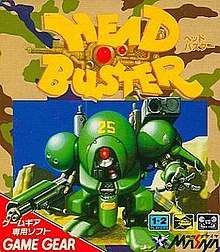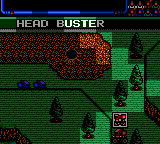Head Buster
Head Buster (ヘッドバスター, Headbuster) is a 1991 video game for the Game Gear handheld console. It involves robots fighting in combat sequences.[1]
 Cover art | |
| Developer(s) | NCS Corporation[1] Winds Co.[1] |
|---|---|
| Publisher(s) | Masaya[1] |
| Producer(s) | Toshiro Tsuchida |
| Programmer(s) | Takahiro Matsuzawa[2] |
| Composer(s) | Noriyuki Iwadare[3] Isao Mizoguchi Hiroshi Fujioka |
| Platform(s) | Game Gear[2] |
| Release | |
| Genre(s) | Strategy involving breeding/constructing[2] |
| Mode(s) | Single-player Multiplayer (up to two players) |
Gameplay

The object is to earn more gold by winning matches and spending that money on better weapons like rifles, missile launchers, and flamethrowers.[1] Robots can be traded in for money (gold) if updating them is impossible. At the center of each starting point is a base (circle). Either the base must be destroyed or all the opponent's robots must be destroyed in order to clear the battlefield.[1] There is a certain range to each weapon; opponents cannot be attacked if they are too close or too far away from the weapon's firing range.
There are ten different maps in the game. Each level has its own password.[4] Players must deliver newspapers for a tiny stipend in order to resume competing after a loss.[5]
Development
The beta version of Head Buster had a different readout of the battle along with more complicated terrain types. Stairs, for example, would have been used to climb up steep mountains. They were removed during the late development stages. Players would have to develop their robots literally from the ground up in the unfinished version while robot models were already fully assembled in the finished version.[6]
References
- "Game information". MobyGames. Archived from the original on 2008-05-10. Retrieved 2009-04-26.
- "Release information". GameFAQs. Archived from the original on 2008-12-12. Retrieved 2009-04-13.
- "Media/composer information". SMS Power. Archived from the original on 2010-07-24. Retrieved 2012-11-28.
- "Advanced game information" (in Japanese). Ameblo. Archived from the original on 2013-12-03. Retrieved 2012-11-22.
- "Consequences of losing". Chris M. Covell. Archived from the original on 2011-07-25. Retrieved 2012-11-22.
- "Development information". Chris M. Covell. Archived from the original on 2014-08-10. Retrieved 2013-01-28.